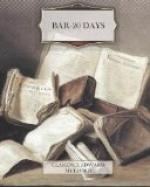Nat Fisher, punching cows for the CG and tired of his job, leaned comfortably back in his chair in the Paradise and swapped lies with the all-wise bartender. After a while he realized that he was hopelessly outclassed at this diversion and he dug down into his pocket and brought to light some loose silver and regarded it thoughtfully. It was all the money he had and was beginning to grow interesting.
“Say, was you ever broke?” he asked suddenly, a trace of sadness in his voice.
The bartender glanced at him quickly, but remained judiciously silent, smelling the preamble of an attempt to “touch.”
“Well, I have been, am now, an’ allus will be, more or less,” continued Fisher, in soliloquy, not waiting for an answer to his question. “Money an’ me don’t ride the same range, not any. Here I am fifty miles away from my ranch, with four dollars and ninety-five cents between me an’ starvation an’ thirst, an’ me not going home for three days yet. I was going to quit the CG this month, but now I gotta go on working for it till another pay-day. I don’t even own a cayuse. Now, just to show you what kind of a prickly pear I am, I’ll cut the cards with you to see who owns this,” he suggested, smiling brightly at his companion.
The bartender laughed, treated on the house, and shuffled out from behind the bar with a pack of greasy playing cards. “All at once, or a dollar a shot?” he asked, shuffling deftly.
“Any way it suits you,” responded Fisher, nonchalantly. He knew how a sport should talk; and once he had cut the cards to see who should own his full month’s pay. He hoped he would be more successful this time.
“Don’t make no difference to me,” rejoined the bartender.
“All right; all at once, an’ have it over with. It’s a kid’s game, at that.”
“High wins, of course?”
“High wins.”
The bartender pushed the cards across the table for his companion to cut. Nat did so, and turned up a deuce. “Oh, don’t bother,” he said, sliding the four dollars and ninety-five cents across the table.
“Wait,” grinned the bartender, who was a stickler for rules. He reached over and turned up a card, and then laughed. “Matched, by George!”
“Try again,” grinned Fisher, his face clearing with hope.
The bartender shuffled, and Fisher turned a five, which proved to be just one point shy when his companion had shown his card.
“Now,” remarked Fisher, watching his money disappear into the bartender’s pocket, “I’ll put up my gun agin ten of yore dollars if yo’re game. How about it?”
“Done—that’s a good weapon.”
“None better. Ah, a jack!”
“I say queen—nope, king!” exulted the dispenser of liquids. “Say, mebby you can get a job around here when you quit the CG,” he suggested.
“That’s a good idea,” replied Fisher. “But let’s finish this while we’re at it. I got a good saddle outside on my cayuse—go look it over an’ tell me how much you’ll put up agin it. If you win it an’ can’t use it, you can sell it. It’s first class.”




